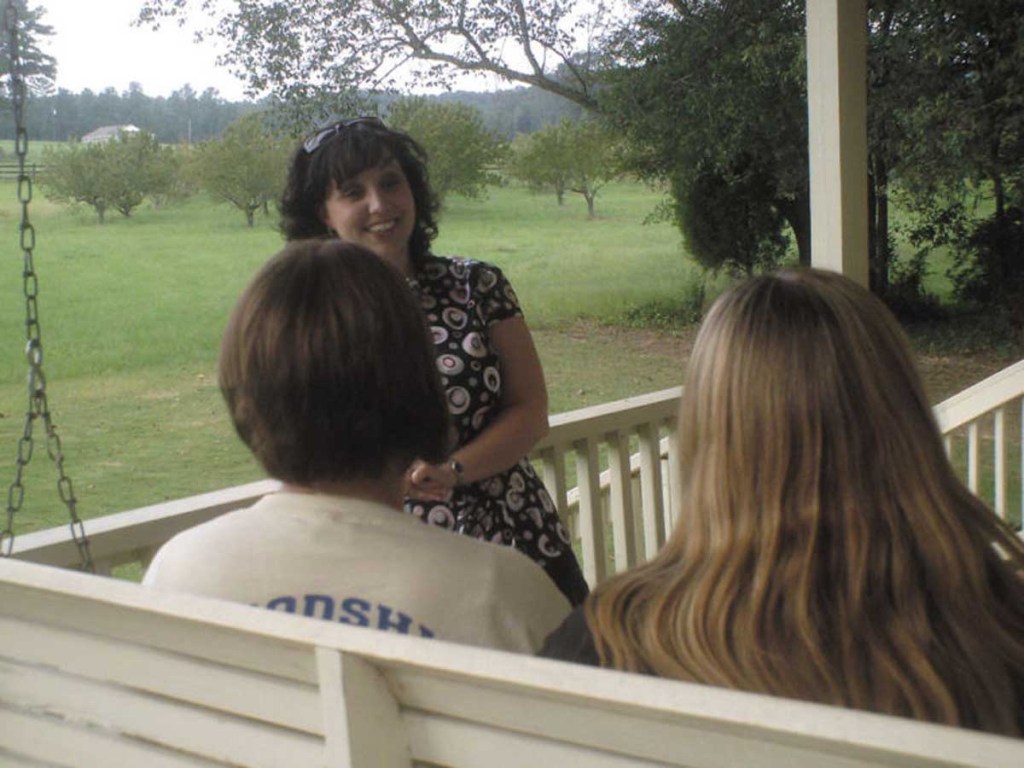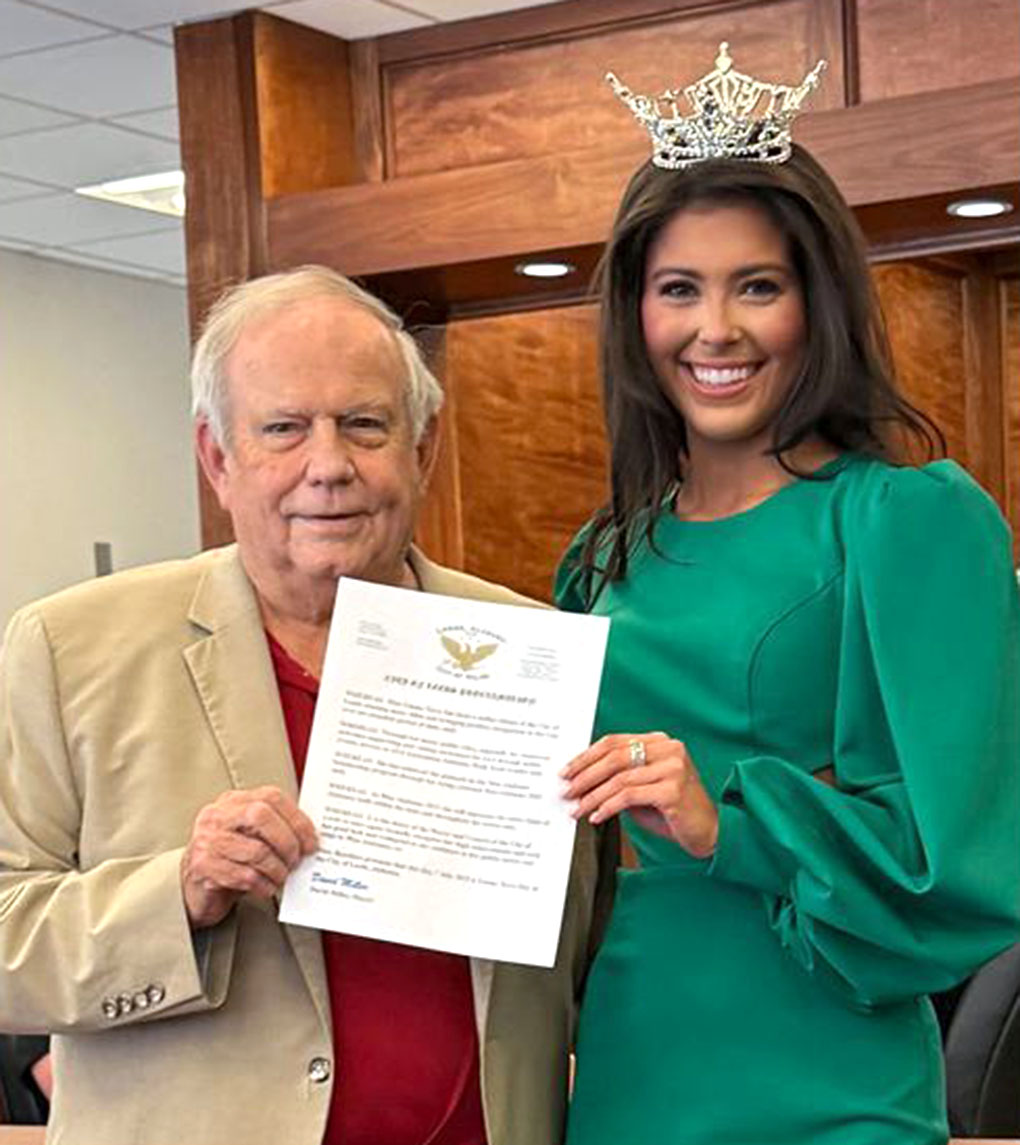“Don’t Stop with Me,” The Journey and Founding of Grace Harbor
Published 12:44 pm Wednesday, September 24, 2008

- Director Carrie Turner Leland chats with other women at the location of Grace Harbor
Grace Harbor opens its doors to homeless women of St. Clair County on October 1st at Lifeline Village. Upon opening they will be prepared to accommodate 14 women and hope to expand to 18 within six months.
Grace Harbor is a residential discipleship program for women who are homeless or in need of a stable and structured living environment. It offers many programs designed to help assist individuals in areas ranging from overcoming drug addiction to managing personal finances.
Carrie Leland, program director, has been helping women-in-need for most of her career, “I feel like sometimes women just come to me and they just really don’t know where to start. They have so many issues they just don’t tackle any of them. I think [Grace Harbor] can be that compass that says, ‘Go this way.’”
When people ask how women get into this type of transient living situation Leland explains, “Because they lack the tools to keep stability and [Grace Harbor] focuses on giving them those tools. We teach financial literacy because every woman needs her own checkbook and needs to know how to balance it. Money does someone no good if they don’t know how to manage it. You can have people who brings in $500 a week and can’t seem to stay out of the homeless situation.”
Grace Harbor offers safe housing and nutritious meals. Their class curriculum includes life skills, career counseling, financial literacy, substance abuse counseling and adult education. Transportation is provided to work and school.
While Grace Harbor is not a domestic violence shelter, some of the residents have been involved in unhealthy relationships. “We teach boundries, healthy relationships and problem solving. Those are some of the courses we teach to help women get to the next stage,” said Leland.
The main qualification to be accepted at Grace Harbor is a willingness to change and to be homeless or in need of a stable or structured living environment. “[They must be] willing to participate in our program because there are two things you can never manufacture in a person: determination and desire. If a person is not determined and desiring to change their circumstance then our program is not going to help,” she said.
“One thing that I am adamantly against is warehousing the poor,” says Leland. “We call it a program and not a shelter because although we are a shelter in the sense of housing we are not what I call ‘three hots and a cot’ which is just a place to lay your head. What we are is a self-sufficiency program meaning a woman can come in unable to manage her life, unable to have housing and have large obstacles that impede her ability to succeed. We help her remove those things one-by-one and become self-sufficient and we do this through education.”
Career counseling is a primary focus of the program. Many of the women are in their 30s but still have not found a career path that works for them. “They just can’t seem to find a job that sticks and part of self sufficiency is finding a job and sticking to it,” says Leland.
Leland feels that working in her hometown gives her an advantage, “I’m aware of the services available right here in St. Clair County. While I don’t teach literacy on site, I do know where to refer a woman to a literacy program, to a job program. [I can say] take these classes here, go over there for literacy council and learn to read, you can get your GED at Jefferson State.”
She said that Jefferson State Community College’s GED program is the number one community resource that they use on a daily basis. “We take women there four days a week for GED tutoring. If you come to Grace Harbor without a GED you have to work on getting one. It becomes one of your requirements. The GED is the start of success,” stated Leland.
Grace Harbor takes women on a referral basis. While most of these come from DHR, the court system and family members, also a woman can self-refer, she said, “Sometimes people get to a low point and decide they need go to a program like Grace Harbor. We hope the churches will become referral points too because they see people who come in needing help with utility bills, rent and are aware of people who need housing.”
She explained that the main difference between a homeless woman and a woman that lives in the nicest neighborhood in the county is circumstances and decisions. “That is the important thing for people to realize about women ‘in the gutter’ or ‘down on their luck,’ so to speak, is that’s the difference—circumstances and decisions.”
Grace Harbor came to be out of a shelter that Leland ran from 2000 to 2005 named My Sister’s Keeper/Hannah Home St. Clair. She said, “I founded and started it after I met a lady in town who was homeless. That really changed the course of my whole life. She inspired me to want to do this for a living. I realized that there wasn’t a whole lot of difference between her and myself and other women I knew.”
Belinda was a prostitute picked up by a truck driver en route from Memphis to Atlanta. Upon reaching Pell City Exit 158 of I-20, they pulled off and stopped at Hardees. Belinda went inside but when she came back out, the truck driver had left without her. She went to the first open church that she could find, First Baptist Pell City.
At that time Leland was working at a home for girls. The church secretary called her in hopes that Belinda could go there for shelter. Leland recalls, “We were a home for minors so the lady could not stay there. But, I didn’t want to just say, ‘Call somebody else.’ So, I went up to First Baptist and there was Belinda. I really felt compelled to help her.”
Leland had contacted a program in Birmingham but they would not be able to take Belinda for four days. Through a network in the church community Leland was able to find a free hotel room and free food vouchers for those four days. When the Birmingham shelter could take her, in true Pell City spirit, a city police car escorted Belinda and Leland to the Birmingham.
“Her last words to me when I left her there were, ‘Thank you for what you have done for me. Don’t stop with me.’ I think those words were something the Lord wanted me to hear. Certainly that has been a transforming moment in my life to have met Belinda and hear those words,” stated Leland
“After that, the word got out that if you had a woman that you didn’t know what to do with call Carrie she’ll know what to do,” she said.
Since 1999 she has helped almost 400 women. She said, “It has certainly been a journey. I feel certainly like it chose me, I don’t know if I chose it. I can’t think of anything better I could have done with my life. I feel really honored that I was patted on the head and maybe somehow told to do this.”
My Sister’s Keeper started as a small nonprofit and then merged with Hannah Home to become Hannah Home St. Clair of which Leland was the director from 2000 to 2005. “In 2005, I married my sweetheart, Matt Leland, who I had met in Leadership Pell City and moved to Opelika,” she said. They stayed there until 2007. When she returned to Pell City, Hannah Home had moved the facility into a building that the organization owned in Chelsea, previously it was in a leased site. “The home didn’t go away it just relocated. It broke my heart that it relocated out of the county because it didn’t relocate because of lack of need.”
She received a call from Lifeline Village that is a maternity home serving adolescent adult women in Pell City. “I like working with people in crisis. I like working with women. It was a good fit for me and Grace Harbor was something that I wanted to see,” she said.
“[Homeless women] is a community need that came up again when I came back and people were calling and saying, ‘I’ve got this woman can you help her but she is not pregnant,’” said Leland. She continued to help these women but found a need to develop a more formal program. She made a presentation to her board at Lifeline Village and they agreed that if she could get the donors and services together they would support her and help her get it started.
Grace Harbor will be housed in a Lifeline Village-owned property. “The board at Lifeline Village has been very gracious to give me so much creative lead,” Leland stated.
“Harbor means a safe place of refuge. Grace means unmerited favor, freely given. That is what Grace Harbor is going to be, a place of safe refuge with unmerited favor, freely given,” she said. Leland got the inspiration for ‘harbor’ from Logan Martin Lake. Father Jeff Garner of St. Simon Peter Episcopal Church, one of the major contributors to the program, suggested that ‘grace’ would be a nice fit. Thus, Grace Harbor.
“I feel like I am the perfect person to be the ambassador for this population because I am only just a little further down the road than they are. Things have gone my way in life that I truly wasn’t deserving of including getting to marry Matthew Leland and including getting to do this again. I feel extremely lucky or maybe blessed would be a better word because I get not only to do this once, but twice, right here in my hometown. Getting to do what I want to do.”
There will be a community luncheon for Grace Harbor/Lifeline Village at noon November 13 at the Civic Center. People are encouraged to attend and learn more about Grace Harbor and how it can serve the community.
For more information about the program or the luncheon call 205-338-6462 or 205-296-1470.




